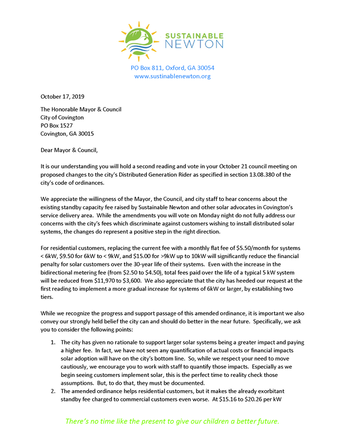|
By Maurice Carter, Sustainable Newton President  Read our letter to Covington Officials Read our letter to Covington Officials When Sustainable Newton partnered with other organizations to launch the Solarize Newton Morgan campaign in the fall of 2018, we were excited to have so many neighbors request a free, no-risk solar evaluation for their property. By the end of the sign-up period, we had registered 229 property owners interested in considering rooftop or ground-mounted solar. But, as we worked with our partners Solar CrowdSource and Alternative Energy Southeast (AES) to evaluate each property, we quickly realized we had a problem. In areas served by utilities like Georgia Power, Snapping Shoals EMC, and Central Georgia EMC, the business case for distributed solar was clear. Property owners willing to make the upfront investment realized they could save tens of thousands of dollars over the 30-year life of their solar system, usually realizing payback on the investment in eight to ten years. But, homes and businesses served by municipal electric companies in Covington, Mansfield, and Oxford learned they faced substantial fees on customers with a distributed electric generation capability (solar, wind, hydro, etc.). These cities purchase power from the Municipal Electric Association of Georgia (MEAG), and MEAG had encouraged its member cities to implement a "standby capacity fee" for distributed generation (DG). The fee, typically based on the size of the solar system, is designed to collect additional revenue to offset lower power bills presented to solar customers consuming less electricity. Ostensibly meant to allow these utilities to recover fixed costs to maintain the power grid, the true effect of the fee is to stifle solar adoption in these service areas, by totally destroying the business case and return on investment. For a year and half, Sustainable Newton has worked to convince city officials to reconsider and eliminate the standby capacity fees they implemented originally at MEAG's urging. In April of this year, the Oxford City Council voted unanimously to remove their standby capacity fee on all residential customers. You can read more about that action here. In Covington, progress has been much slower. But -- with our persistence and city officials' patience -- we're finally getting somewhere. On Monday, October 21, in their 6:30 PM meeting, the Covington City Council will vote to amend their Code of Ordinances to reduce the standby capacity fee. While not a total elimination of the residential fee, as in Oxford, the Covington City Council will replace their current variable fee ($10.25/kW, based on 60% of the full system capacity) with a flat fee based on three capacity tiers, as follows:
Under current ordinances, residential customers are also billed $2.50/month for bidirectional metering. Under the new ordinance, the city increased that metering fee to $4.50. To understand the impact of the lower Covington standby fee, consider a typical 5 kW solar system. Today, a homeowner with a 5kW system would pay $33.25/month, amassing $11,970 in fees over the 30-year life of their system, which is considerably more than the cost of the system itself. (Small wonder no Covington homeowners have signed up for the solarize program!) Under the fee structure to be considered Monday night, that same 5kW system would result in fees of $3,600 over the life of the system. Sustainable Newton opposes any standby capacity fee for any class of customers. These fees single out solar customers and punish them for energy efficiency in ways we do not penalize those who lower energy use through investments like better insulation, LED light bulbs, high-efficiency appliances, etc. So, we still have a long way to go. The $3,600 in the scenario above is still significant in comparison to the $900 charged in Oxford for the $2.50/month metering fee. And, both Oxford and Covington still impose very high fees that make solar impossible for commercial and industrial customers. But, the pending action by the Covington City Council is a positive step in the right direction. In a letter sent today from the Sustainable Newton Board of Directors to the Covington Mayor and council, we thank them for their willingness to hear our concerns and to take some action. We also ask them to continue to partner with us to more fully address this issue going forward. We have far to go, but we can only get there when we work together. If you live within the city limits of Covington, you can help us, in the following ways:
0 Comments
Leave a Reply. |
Categories
All
Archives
February 2024
|
Photos from Chemist 4 U, shixart1985 (CC BY 2.0), Juhele_CZ, EarthLED, shixart1985, EcuaVoz, Chemist 4 U

 RSS Feed
RSS Feed
